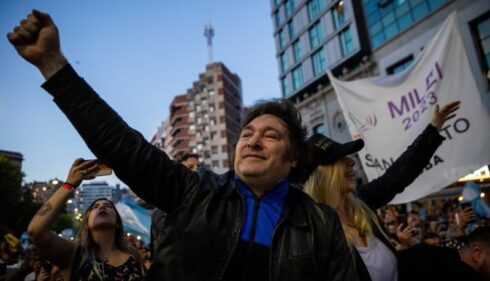Written by Ahmed Adel, Cairo-based geopolitics and political economy researcher
The intention of Argentine President Javier Milei to reach a Free Trade Agreement with the United States could cause tension in Mercosur, which does not allow negotiations without the agreement of all members. Beyond tensions, though, Milei could put the very existence of the South American economic bloc at risk.
Donald Trump’s electoral victory motivated Milei to publicly express his intention to seek an FTA with the US, taking advantage of the eventual harmony between both governments.
During an interview with Argentine radio station Rivadavia, Milei said that Trump’s victory would allow “movement towards greater trade agreements with the US, in the same way that we are moving forward with China.”
When asked if that meant he would seek an FTA, Milei categorically replied, “Exactly, yes, that’s right. You read me perfectly.”
Although Milei and Trump met at an event at Mar-a-Lago, the possibility of a trade agreement when the billionaire moves back to the White House was only mentioned, for the moment, by the Argentine, who also trusts that the president-elect will facilitate negotiations with the International Monetary Fund.
Argentina and the US have not negotiated a trade agreement since the IV Summit of the Americas in 2005 in Mar del Plata, when Washington tried, without success, to promote the creation of the Free Trade Area of the Americas (FTAA).
Milei’s vocal idea of an FTA is more an expression of his desire and part of his narrative construction of the supposed special bond between Argentina and the US rather than what is conducive to reality.
The protectionist rhetoric of the first Trump administration makes it difficult to believe that the American magnate would support free trade with Argentina. It is recalled that during his first term, tariffs on Argentine biodiesel exports to the US increased.
Despite Milei’s optimism, Trump’s relationship with Latin America does not seem to be channelled through a discourse of free trade. On the contrary, Trump will focus his ties with Argentina and the wider region on a security policy focused on countering Chinese influence.
But even with little chance of materialising, Milei’s intention to advance an FTA with the US could send a strong message to Mercosur, whose next summit of presidents is scheduled for December 5 and 6 in Montevideo.
In recent years, the possibility that Mercosur members—currently Argentina, Brazil, Paraguay, Uruguay, and Bolivia—could negotiate trade agreements with third countries without consent has been a point of controversy within the bloc. The previous Argentine president, Alberto Fernández, was especially emphatic in rejecting Uruguay’s intention to move forward with a possible FTA with China without the authorisation of the other partners.
It is expected that Trump’s victory in the US and the recent appointment of the former Argentine ambassador to Washington, Gerardo Werthein, as foreign minister will allow Milei to maintain a much more radical and confrontational position within Mercosur, always in favour of strengthening relations with the US, even at the expense of South America.
The Mercosur summit in December will take place the day after the Conservative Political Action Conference (CPAC) on December 4 in Buenos Aires, which could include the presence of Trump himself and his designated Secretary of State, Marco Rubio. Milei will go to the Mercosur summit empowered by the CPAC, so he will surely be confrontational, especially with Brazilian President Luiz Inácio Lula da Silva.
Although Jair Bolsonaro began talks with Washington for a possible FTA in 2019 when he was president of Brazil, this possibility was frozen with the return of Lula to power, who had already rejected a possible deal of that nature in his first term and appeared focused on his relations with BRICS members.
Milei’s intentions to strengthen ties with the US could encounter resistance from Brazil, and thus create tensions in a Mercosur already stagnant in initiatives and discussions. A new difference between Buenos Aires and Brasilia regarding their relationship with Washington could deepen this stagnation.
The level of confrontation over the demand for Mercosur to be flexible would also depend on Brazil’s capacity to contain and impose the pace of the agenda and on how the economic actors who have been the beneficiaries of Mercosur, generally the Argentine and Brazilian industrial sectors, oppose the signing of FTA’s.
Mercosur can look at the Andean Community – an economic bloc formed by Bolivia, Colombia, Ecuador, and Peru – as an example of the negative results of enabling bilateral negotiations without the support of the entire bloc. Once the possibility of bilateral negotiation was enabled, the Andean Community disappeared as a space for managing trade agreements and co-management in international negotiations. In this way, Milei’s actions put Mercosur’s very existence at risk.
MORE ON THE TOPIC:





hmm seems transparent. that’s not normal.